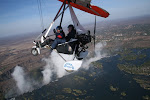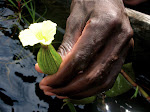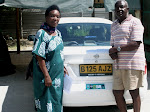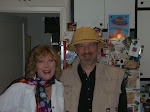



Maun, Botswana
Nov. 22, 2008
Often in my time in Botswana I have met tourists intent on checking off the animals on their lists. They have watched the National Geographic documentaries, so they arrive tuned and ready: “Lion…Order up!” They simply MUST see a lion or a leopard or a wild dog or a cheetah. They don’t want to hear how filmmakers spent a year in the bush to capture the images seen on TV. They look to the guide to deliver on demand.
Is it any surprise that the vibe of “power and control” is in the air when they take their first steps on the Maun tarmac wearing their starched khaki ensembles, with a host of techno-camper gadgets at the ready? I wonder if the animals sense it, because they sometimes prefer to hide away on their own holiday rather than meet the guests. I like to imagine the elephants down by the water hole stamping their feet and sharing a few chuckling snorts about the Air Botswana parade. They tell their jokes and before the guests return from an afternoon game drive, the ellies amble off silently in all directions, lickety-split into the bush, just for the fun of leaving lodge managers to say, “You just missed them! I promise. There must have been 10 bull elephants at the water hole, not 5 minutes ago.”
What I wish for anyone who visits Botswana is to arrive with senses wide open for all that can be perceived. An opening of the heart will surely follow, by virtue of approaching the land’s treasures with the reverence of a novitiate, from the Fireball lily ablaze in scarlet to the dung beetle rolling a ball of wet buffalo poo with Herculean purpose. Where is that armored fellow going with that boulder of dung and at such speed? Sit and watch. The landscape and its occupants are grand, the whole of it, not just The Big Five.
Across the planet we are all sojourners among landscapes in constant change. It’s easy to miss the unfolding of the miracles where most of us live, stuck in traffic jams, a Bluetooth in our ear, a Blackberry on our dash. Underneath it all and through it all is a tapestry of nature woven from morning to night and all night through, indeed woven right through us. We forget to look for the gossamer threads. We’re walking amnesiacs huddled on street corners waiting for the light to say proceed. Here, in Africa, the recognition slaps us in the face, wakes us up. This is the light you’ve been waiting for. This is where you came from, this is what you’re connected to, this is the new news, same as the old news. Forget Times Square, for a digital moment anyway.
The other day I was in Camp Moremi, surprised to find I would be the only one on a game drive with guide Kagiso, a river bushman whose name means “peace.” I was overnighting at the camp to interview managers and guides. I hated to take Kagiso away from a rare opportunity to have an afternoon break. Just an hour’s drive would be fine, not the usual 2 ½ to 3. Anything we saw would be appreciated, I assured him. (This is usually the time I tease guides by amping up my demands, “You must find me a lion today!” We have a good laugh over it.) I was happy to see the Fireball lilies and dozens of baby impalas, tiny antelopes that belong under the lid of a music box, some of them not more than two days old, grazing and skipping throughout the reserve but sticking close to their moms.
I looked at my watch. We’d been out for an hour. It’s ok to go back now, I told Kagiso. Not far away an African fish eagle watched over the pond where golden-green crocodiles rested on the banks. The eagle took to the sky, throwing back its head to call its long whistling cry. (I am determined the sound of the fish eagle will be my cellphone ring tone back in the States. It will be the signal that elbows me in the ribs, “Wake up. Remember.”)
Kagiso started the truck rolling, but something caught his attention in the wet sand. Fresh leopard tracks. He wanted to check them out. Fine by me. Whatever we saw would be a gift. I really meant it.
You can see photos of the male leopard Kagiso tracked, a leopard with yellow eyes that were sparks. For some unknown reason, the leopard granted an audience, letting Kagiso and me join him on his afternoon walk, we in the truck of course, inching behind. To my astonishment, we spent 45 minutes with this leopard while he scratched his head against a log, sharpened his claws, marked his territory, rolled in the grass and sipped water from a puddle in the road. He was close enough that if I had leaned out of the truck I could have petted him. Radical notion, that one.
I was so close I watched the heaving of his chest as he breathed. How can nature paint a coat like that? I wondered. I found myself transfixed by him but not unaware of the whole. In the distance a giraffe stopped eating fresh leaves from an acacia treetop to crane his neck; his neck was the Tower of Pisa. (Did you know, despite that long neck, the giraffe has the same number of vertebrae as you and I?) The impalas froze as if on ice. The leopard carried on. Nothing else moved except the red-eyed francolins. They squawked and scattered about in a panic, sounding the alarm calls, running around like headless chickens. The leopard lazed. He was the picture of nonchalance. No question who was boss on this reserve.
To think the visitation happened without a whit of desperation on my part or that of Kagiso. The leopard granted us an audience, and we accepted with reverence. It was one of those moments of grace, fleeting yet eternal. I wish all the guests in Botswana could have shared it with me. Then they would understand and perhaps remember to keep their eyes open for the gossamer threads at home.
















